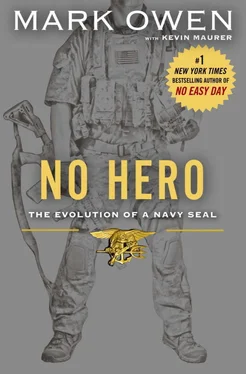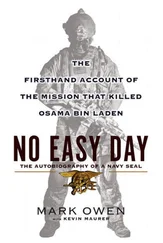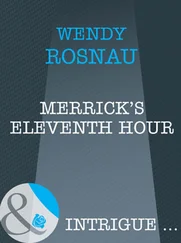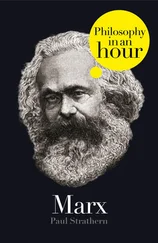After the question-and-answer period, we had a short break before the next event. I ran upstairs to my hotel room to change into my black SEAL T-shirt. I wanted to get my picture taken with the SEAL. I figured if I was going to get a photo, I’d better be wearing my favorite shirt. When I got back to the room, the SEAL was still talking and taking questions.
I waited patiently for my turn.
“Hey, can I get a picture with you?” I asked, shaking his hand.
He smiled and put an arm over my shoulder. If he told me to shave my head and walk backward the rest of the week, I’d have done it. Just before one of the chaperones snapped the picture, he leaned over and whispered into my ear.
“Hey, you know you usually get your ass kicked for wearing a SEAL T-shirt when you’re not a SEAL,” he said.
I smiled and thanked him, but at that moment all I wanted to do was get the shirt off. I raced up to my hotel room and buried the shirt in the bottom of my suitcase. I never put it on again. When I got home, I put it in the back of my dresser drawer. I wasn’t a poseur. I just hadn’t had a chance to prove myself yet. The comment didn’t sting as much as it fueled my passion to actually become a SEAL. I felt like I’d cheated myself by wearing it. It was then I realized my desire to be a SEAL wasn’t an adolescent fantasy. It was the only thing in my mind that would give my life some real meaning and purpose. I wanted to earn the right to wear the shirt.
Once I realized my purpose was to be a SEAL, I never stopped trying to achieve it. Looking back, I think my parents taught me that having a purpose and living up to it was important. My parents were young when their purpose brought them to Alaska, and I knew it meant sacrifice and hardship.
My parents were missionaries. Their faith drove them to move our family from California to Alaska, far from any of the creature comforts of a city. There was nothing easy about living in a village, but that didn’t matter to my parents. Everyone was poor by suburban American standards, but really it was just a more simple life.
We lived in a two-story house one hundred yards off a river. I saw moose from my front door so often that it didn’t amaze me. There was one TV station and no radio. Our house had water and electricity, but no central heating. We used a massive iron stove in the living room to keep warm in the winter. My father would get up in the middle of the night to make sure the fire was still going.
A huge hopper stood next to the stove. It was my job to keep it full of wood in the winter. I’d split the logs and keep the woodpile stacked on the porch. As the stack in the hopper dwindled, I’d be out on the porch getting another load. Chores for me weren’t a way to make some spending money. We never got paid. It was part of my family’s team effort to survive in Alaska.
One of my first memories of elementary school was fire building. Instead of just teaching us how to read or write, our school taught us survival skills. Each student in my third-grade class got two matches to start a survival fire using bark from trees surrounding the school. We had to build a fire big enough to stay warm during a winter day. The drill was designed to teach us the survival skills that we might need if we ever got lost or became stranded. Alaska’s wilderness can be a very dangerous place if you don’t know what you’re doing, making the walk to and from school hazardous.
My high school was one hallway with six rooms. It had about seventy kids in grades seven through twelve. My senior class was three students. I graduated as the valedictorian; just don’t ask me what my grade point average was. My interests were mostly outside the classroom.
I hunted as often as I could. When I was a teenager my father would let me take the family boat up the river for long camping and hunting trips. I wanted to be outside and active, which likely led to my goal of being a SEAL. I never wanted to have to deal with stoplights, traffic, and wearing a suit to work every day. The thought of working in a cubicle sounded like a death sentence.
I purchased my first assault rifle at school from my history teacher. It was an AR-15, a civilian version of the military’s M-4. I’d earned the money for the rifle doing odd jobs for people in the village and working construction in the summer. Between classes, I paid my teacher seven hundred dollars, then took the rifle and locked it in my locker until the end of school. When the bell rang, I put it on the back of my snowmobile and rode home. Yes, I did ride a snowmobile to school in the winter.
Anything we couldn’t get from the land, we bought from the two stores in town, or during a semiannual trip to Anchorage to stock up. Because we lived so far from Anchorage, groceries were expensive. Milk was six dollars a gallon in the village, so my parents bought less expensive powdered milk.
The powdered milk was sold in massive tubs, too big to store on the kitchen counter. To make it easier for daily use, my mother measured out small amounts and put the powdered milk in plastic bags. She did the same thing with the tub of laundry soap and other bulk goods.
One morning, I fixed myself a big bowl of cereal. My mother was busy at the stove making pancakes for my father. The batter was bubbling up into big, fluffy pancakes as I poured the milk over my cereal.
Sitting at the table, I took a few bites, but it didn’t taste right. I stirred the cereal around and I swore I saw suds. I started to get up to throw the bowl of cereal away, when my father stopped me.
“Eat it,” he said. “It’s just the powdered milk, and that is the way it tastes.”
I tried to protest. “It isn’t that,” I said. “It has a sour taste. It tastes like soap.”
“You just have to get used to it,” my father said.
I never liked the taste of powdered milk, but there was something wrong with this batch. I choked down the whole bowl one spoonful at a time. After a while, my taste buds died. I couldn’t taste anything but the sour, soapy flavor of the milk. My father’s pancakes showed up soon after I finished my cereal. He took one bite and spit it out.
“What is wrong with these?” he asked my mother.
My mom stopped plating a short stack of pancakes for my sister and gave the batter a quick stir. She then picked up the plastic bag and sniffed it.
“I think I might have used laundry detergent instead of powdered milk,” she said, with a sheepish smirk on her face. “No wonder the pancakes bubbled up so much.”
My mother started to laugh, then my father. When they realized I’d eaten a bowl of cereal with soapy water, they laughed harder. I tried to laugh too, until my stomach started to hurt.
My mother poured out the batter and started fresh. When she offered me a fresh bowl of cereal, I declined. My stomach was doing flips and I had bubble guts the rest of the day.
Living in Alaska was hard, and it wasn’t always because I had liquid soap in my cereal. There was nothing normal about my upbringing, but my parents knew the sacrifices they were making. They didn’t have to choke down horrible-tasting powdered milk or live in a village deep in the Alaskan wilderness. They chose to live a harder life than most because it was the only way my parents could achieve their purpose in life, to be missionaries and spread their faith. I know their dedication rubbed off on me. It gave me the values I needed to eventually excel in the Navy.
My parents set me on a course that wasn’t the norm in the village. People didn’t leave the village. They found jobs working construction in the summer and just lived off their savings and the land during the winter. My parents urged me to dream big and find my own way. I was one of the few kids I grew up with who had plans of doing something beyond staying in the village.
Читать дальше










